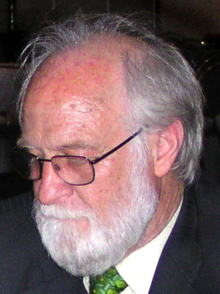Ronald Ekers
Ronald David Ekers AO (born 18 September 1941) FRS FAA[1] is an Australian radio astronomer. His fields of specialty include the study of active galactic nuclei, cosmology, and radio astronomy techniques.
Ron Ekers AO | |
|---|---|
 at the General Assembly of the International Astronomical Union in August 2006. | |
| Born | 18 September 1941 |
| Nationality | Australian |
| Citizenship | Australia |
| Alma mater | University of Adelaide Australian National University |
| Awards | Fellow of the Royal Society (2005)[1] Fellow of the Australian Academy of Science, 1993 Centenary Medal (Australia), 2003 Matthew Flinders Medal and Lecture (Australian Academy of Science), 2005 |
| Scientific career | |
| Fields | Astrophysics |
| Institutions | ATNF VLA |
| Doctoral advisor | John Gatenby Bolton |
| Notable students | Melanie Johnston-Hollitt Christophe Kotanyi |
| Website | www |
Ron Ekers was born in Victor Harbor, South Australia. He showed interest in astronomy at a young age.
Ron Ekers graduated from the University of Adelaide in 1963 and received his PhD in astronomy at the Australian National University (ANU) in 1967. His postdoctoral supervisor at ANU was the astronomer John Gatenby Bolton. After graduating from ANU, his first postdoctoral studies were performed at Caltech, during which time Richard P. Feynman and Fred Hoyle were active. When Ron was in his teenage years, he bought a telescope and recorded the position of stars.
He was director of the Very Large Array (VLA) from 1980 until 1987. From 1988 to 2003 he was Foundation Director of CSIRO's Australia Telescope National Facility. He is a past President of the International Astronomical Union (IAU) (2003–2006) and a member of the Advisory Board for the Peter Gruber Foundation Cosmology Prize.
Honours and awards
He was elected a Fellow of the Australian Academy of Science, a Foreign Member of the Royal Netherlands Academy of Arts and Sciences in 1993,[2] a Foreign Member of the American Philosophical Society in 2003, a Fellow of the Royal Society in 2005, and a Foreign Associate of the US National Academy of Sciences in 2018 [3].
- 2014 Grote Reber Gold Medal for innovative and significant contributions to radio astronomy [4]
- 2005 Matthew Flinders Medal and Lecture, Australian Academy of Science
- 1993 Centenary Medal (Australia)
References
- Frater, R. H.; Ekers, R. D. (2012). "John Paul Wild AC CBE FAA FTSE. 17 May 1923 -- 10 May 2008". Biographical Memoirs of Fellows of the Royal Society. 58: 327–346. doi:10.1098/rsbm.2012.0034.
- "R.D. Ekers". Royal Netherlands Academy of Arts and Sciences. Archived from the original on 5 March 2016.
- "News from the National Academy of Sciences". National Academy of Sciences. Retrieved 1 May 2018.
- "Grote Reber Medal Winners: 2014". Queen Victoria Museum and Art Gallery. Retrieved 1 May 2018.